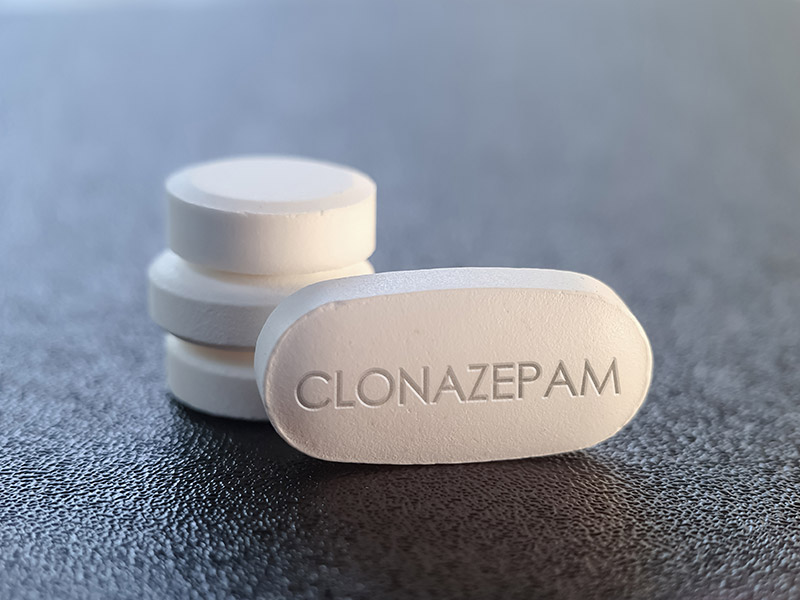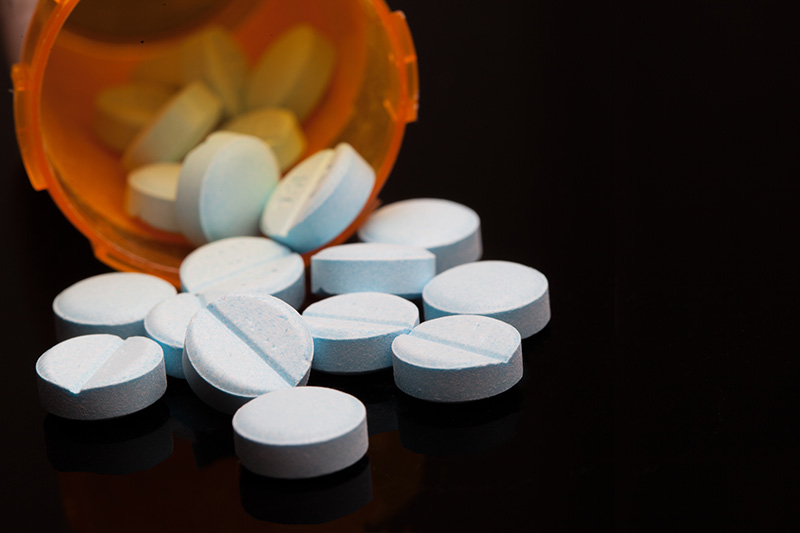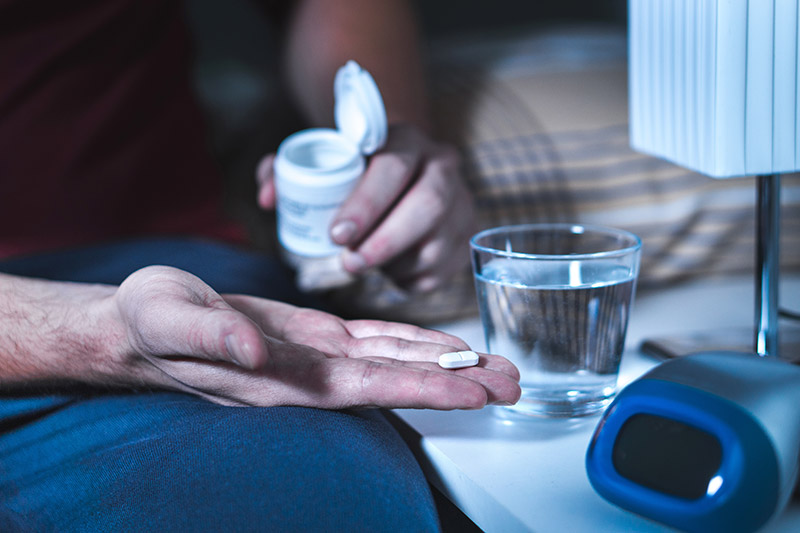Detoxing from Prescription Drugs
Prescription drug dependence can occur even when certain medications are taken as prescribed. Depending on your usage of the medication and what medication you are using, a detoxification may be necessary. This guide explains the different ways to detox from prescription drugs safely, and the various challenges associated with withdrawal.
- What is a Prescription Drug Detox?
- Understanding Withdrawal Symptoms
- Detox & Withdrawal from Stimulants
- Detox & Withdrawal from Benzodiazepines
- Detox & Withdrawal from Opiates
- Detox & Withdrawal from Sleeping Pills
- Detox & Withdrawal from Antidepressants
- How to Detox from Prescription Drugs Safely
- The Benefits of a Residential Detox
What is a Prescription Drug Detox
Detoxification is the process of removing prescription drugs from your system, this process should be managed by a medical professional. Your GP is usually the first port of call and may choose to start you on a different medication, or slowly taper you off.
If you or someone you love is abusing prescription medication with other drugs including alcohol, a more tailored detox programme should be considered due to the complexities associated with addiction and withdrawal.
According to WebMD, the most misused and addictive prescription drugs are:
- Opioid painkillers, including oxycodone, morphine, codeine and fentanyl
- Central nervous system (CNS) depressants, including tranquilizers like benzodiazepines and the anti-anxiety medication alprazolam (commonly known by the brand name Xanax)
- Stimulants like amphetamines such as Methylphenidate, which are commonly prescribed for attention deficit hyperactivity disorder (ADHD)
A detox or private rehab clinic can also assist with treating the underlining causes of prescription drug addiction or abuse, in the form of therapy and counselling sessions.

Understanding Withdrawal Symptoms
The discontinuation of long term, chronic use of prescription medication should not be done ‘cold turkey’ as the withdrawal symptoms associated with certain prescription medication can be difficult.
Withdrawal symptoms are determined by the following:
- Longevity of use
- Dosage
- Type of prescription medication used
- Underlying reasons for medicating
Along with the withdrawal symptoms you may be experiencing:
- Strong cravings for the medication
- Headaches
- Body weakness
- Hypersensitivity to touch & pain
- Tremors & shakiness
Dualdiagnosis.org states that you could also experience a return of the ailments you were medicating against
- Pain
- Depression & Anxiety
- Fatigue
- Insomnia
- Poor concentration and impulsivity (ADHD symptoms)
Detox and Withdrawal from Stimulants
Stimulants such as methylphenidate (Ritalin / Concerta) or Amphetamine (Adderall) normally prescribed for the treatment of ADHD can cause dependence and addiction over time.
Withdrawal symptoms from prescription stimulants include:
- Fatigue
- Depression
- Sleep problems
- Strong cravings for the medication
- Having mood swings that range from feeling depressed to agitated to anxious
- Feeling tired all day
- Not able to concentrate
- Seeing or hearing things that are not there (hallucinations)
- Physical reactions may include:
- headaches,
- aches and pains,
- increased appetite,
- not sleeping well
The National Institute on Drug Abuse reports that long-term prescription stimulant use or abuse can also increase the risk of:
- Psychosis
- Anger
- Paranoia
- Heart, nerve and stomach problems
If you have ADHD and you are concerned about your use of stimulant medication, your GP may offer a non-stimulant replacement with less abuse potential (i.e. atomoxetine).

Detox & Withdrawal from Benzodiazepines
Benzodiazepines are a type of psychoactive drugs, used to treat anxiety, seizures, muscle spasms and insomnia. Both chronic & recreational use, within weeks can build up a tolerance in your body to the intended effects and may lead you to becoming dependent or even addicted.
Benzodiazepine withdrawal symptoms include:
- Seizures
- Shakiness
- Anxiety
- Agitation
- Insomnia
- Overactive reflexes
- Increased heart rate
- High blood pressure
- Fever with sweating
- Hallucinations
Benzodiazepine detox and withdrawal can be difficult, a GP would likely taper your dose over a period of time to prevent serious withdrawal symptoms. However, if you’re abusing benzodiazepines and other drugs including alcohol, a detox programme as part of a prescription drug rehab programme may be better suited.

Detox & Withdrawal from Opiates and Opiate Substitutes
The severity of opiate withdrawal symptoms you may experience during and after detoxification depends mostly on the amount of opiate taken per day as well as which opiate is being used – Opiates include codeine, Tramadol, Fentanyl and opiate substitutes such as Methadone.
Opiate withdrawal symptoms may include:
- Dilated pupils
- Nausea
- Fatigue
- Sweating
- Muscle and joint aches
- Anxiety
- Irritability
- Shakiness
- Increased heart rate
- Goosebumps
- Excessive Yawning
If you have developed an Opiate Use Disorder, the best course of treatment would be an opiate detox through a private treatment centre where you will be monitored 24/7 by trained professionals equipped to address opiate addiction. Once your detox is complete, a personalised opiate rehab programme will be available to you as part of a long term recovery plan.

Detox and Withdrawal from Sleeping Pills
Sleeping pills or Central Nervous System Depressants (CNS) include certain antidepressants like Trazodone, non-benzodiazepines like Zolpidem and even over the counter antihistamines.
Whilst not as addictive as Benzodiazepines, you may feel some withdrawal symptoms from any of the central nervous system depressants such as:
- Seizures
- Shakiness
- Anxiety
- Agitation
- Insomnia
- Overactive reflexes
- Increased heart rate
- High blood pressure
- Fever with sweating
- Hallucinations
If you are suffering with long term chronic sleep problems it may be prudent to understand what is causing it. Long term use of sleep medication can worsen your quality of sleep.

Detox and Withdrawal from Antidepressants
Most antidepressants are not addictive or habit-forming, so, unlike drug withdrawal, antidepressant discontinuation effects are not related to addiction but can reflect physiological consequences of the sudden absence of increased serotonin levels.
Symptoms of antidepressant withdrawal depends on the specific medication you have been taking so you may only experience some or all of these:
- Anxiety
- Depression and mood swings
- Dizziness and balance problems, possibly vertigo
- Electric shock sensations
- Fatigue
- Flu-like symptoms
- Headache
- Loss of coordination
- Muscle spasms
- Nausea
- Nightmares
- Tremors
- Trouble sleeping
- Vomiting
In rare cases, antidepressant withdrawal may cause mania. Symptoms most often occur within three days of stopping the antidepressant.
How to Detox from Prescription Drugs Safely
Detoxing from prescribed medication should always be done in accordance with recommendations from a medical professional. This is true regardless of whether you were prescribed the medication or buying them online.
Prescription drug addiction can affect all areas of your life, from work to relationships and even finances, so it is important to seek the support you and your family needs.
Speak to your GP
The first step if you are noticing a tolerance or dependence forming with the medication you have been prescribed, they can discuss alternatives, treatment options and recommendations to help you safely work through your need for the medication. A GP may prescribe an alternative medication with a lower risk for dependence.
If you are Abusing Prescription Medication
If you are abusing prescription drugs and have developed an addiction, a rehab programme may be better suited for you.
We can assist you with finding the best treatment programme and facility for your individual needs.
Detox and withdrawal can be daunting, unpleasant and scary and your unique needs need to be taken into consideration when structuring a treatment plan.
A treatment should include a combination of medical care, psychiatric services, counselling, behavioral therapy, vocational training and other services to best support the whole of you throughout recovery.
The Benefits of a Residential Detox
Where addiction has been identified, or in situations of long term dependency, a residential detox followed by therapy within a rehab centre will provide additional layers of safety and comfort.
Delivered in a supportive and holistic environment, residential rehab aims to identify the underlying triggers or psychological reasons for your addiction and address co-occurring conditions including depression and anxiety.
This is where you will meet with a therapist on a daily basis, during these sessions, the practitioner will help you look at the nature of your addiction and assess whether pre-existing mental health conditions, hereditary factors, or trauma is contributing to your dependence.
In addition, a medically managed detoxification can help with:
- Alleviating physical suffering.
- Ensuring your body’s safe transition to a toxin-free state
- Reducing mental and physical withdrawal symptoms.
- providing extra nutrients and vitamins to supplement your body
- 24/7 assistance through the detox process as well as supportive care during and after your stay to help you maintain your sobriety.
- Teaching you coping strategies to minimise and manage your cravings
- Keeping you motivated
- Getting your loved ones involved in family therapy sessions that strengthen the whole family as a tool against relapse
- Introducing you to the 12 steps programme and a community support group
A holistic treatment plan where you are considered as a whole is developed with beneficial health-oriented activities incorporated, such as, balanced diets, exercise including yoga, medication, and individualised healthcare that aims to restore your physical, mental, and spiritual connection.
